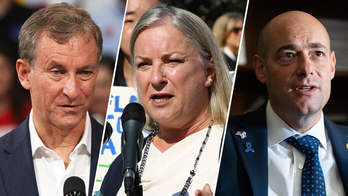Republican Convention: Rubio on Romney, Ryan and More
Florida Sen. Marco Rubio talks about Mitt Romney, Paul Ryan and more.
After a prominent Latino Democrat began attacking Republicans, accusing their attempt to woo Latinos as insincere, Marco Rubio had a simple message: Your party is doing no better for Latinos.
The Florida senator said both political parties need to do more to address the needs of Latinos – even Democrats.
"The Republican Party does have a challenge," Rubio said Wednesday on ABC's "Good Morning America." ''We can't just be the anti-illegal immigration party, we have to be the pro legal immigration party and I think Mitt Romney has done that."
Rubio, who is Cuban American, added that there are problems with Obama's decision to stop deporting younger undocumented immigrants who came to the U.S. as children. Romney has promised to change that strategy but has not specified how.
Rubio’s comment came in response to Los Angeles Mayor Antonio Villaraigosa, who said the array of Hispanic speakers at the GOP convention isn't enough for Mitt Romney to woo Latino voters.
“You can't just trot out a brown face or a Spanish surname and expect people are going to vote for your party or your candidate." said Villaraigosa, who is Mexican American. “This is a party with a platform that calls for the self-deportation of 11 million people."
The Republican Party does have a challenge. We can't just be the anti-illegal immigration party, we have to be the pro legal immigration party and I think Mitt Romney has done that.
Romney campaign senior adviser Danny Diaz characterized Villaraigosa's comments as "divisive." He said they were part of the increasingly personal attacks by President Barack Obama's campaign that are designed to distract voters from the struggling economy.
"We are very confident that once our story is told, the vast majority of voters will pull the lever for Gov. Romney, and that we will include strong support from Latino voters," Diaz said.
But Villaraigosa’s barbs did underscore Romney’s complicated effort to attract the Latino vote.
Prominent Latino speakers at the Republican convention include Rubio, who is set to introduce Romney on Thursday; New Mexico Gov. Susanna Martinez; Rep. Francisco Canseco of Texas; Sher Valenzuela, the Republican candidate for lieutenant governor of Delaware; Nevada Gov. Brian Sandoval; and Ted Cruz, GOP Senate nominee from Texas.
Luce Vela Fortuno, the first lady of Puerto Rico, introduced Ann Romney on Tuesday.
Latino voters could make the difference for both Obama and Romney, given that the election will probably hinge on swing states with large Hispanic populations, such as Florida and Colorado, and is expected to be close. Some 12.2 million Hispanics are expected to vote this November, according to projections by the nonpartisan National Association of Latino Elected and Appointed Officials.
Rubio told ABC that Republicans have a real challenge.
“We have a broken system of immigration that needs to be fixed and we have a legal immigration problem because we have millions of people who are in this country without documents and we have to deal with that in a way that honors our legacy both as a nation of compassion and a nation of immigrants but also as a nation of laws,” Rubio said. “That’s a real challenge. That’s not an easy thing to do. We’re going to confront that not by pandering, not by making unrealistic promises but by trying to find a balanced approach to how to deal with it.”
Latinos heavily supported Obama in 2008, and Romney has made efforts to court them in hopes of winning a larger share of their votes. Earlier this summer, Obama was outspending Romney in advertising directed at Spanish-speaking Latinos. Both campaigns are also posting ads on the Web.
This week, the Romney campaign released a Spanish-language television ad, "Juntos (Together)," in which Romney speaks in English and his words are translated into Spanish with subtitles. The campaign also released a 60-second radio ad this week featuring Romney's son, Craig, speaking in Spanish.
Still, polls consistently show Romney is struggling to gain traction. An Aug. 6-26 Gallup poll showed 61 percent of registered Hispanic voters supported Obama and 29 percent backed Romney.
Romney's campaign has said it is aiming for 38 percent. On Tuesday, Villaraigosa estimated Democrats would get about 70 percent of Latino voters.
There is no shortage of ideas on why Romney is struggling.
In an open letter to the GOP published last week, Univision news anchor Jorge Ramos told Republicans they will lose the Hispanic vote in November and "might be condemned to lose the White House for many decades" due to positions such as Romney's opposition to legalization for undocumented immigrants and his push for self-deportation, an idea that people who are in the country illegally might leave the U.S. on their own if life is made difficult enough for them.
Ramos, who broadcasts in Spanish and is one of the most watched anchors in the United States and across Latin America, said Republicans have squandered commonalities with Hispanics, such as opposition to big government and abortion, and instead made themselves enemies of immigrants.
It's a sentiment shared by Guy Sideboard, who was born in Puerto Rico and moved to Tampa as a boy.
"As a Latino, I believe in hard work," said Sideboard, a bilingual information technician. "But there are many Latinos who don't have many opportunities, and I don't think Romney can relate to them at all."
Based on reporting by The Associated Press.
Follow us on twitter.com/foxnewslatino
Like us at facebook.com/foxnewslatino





